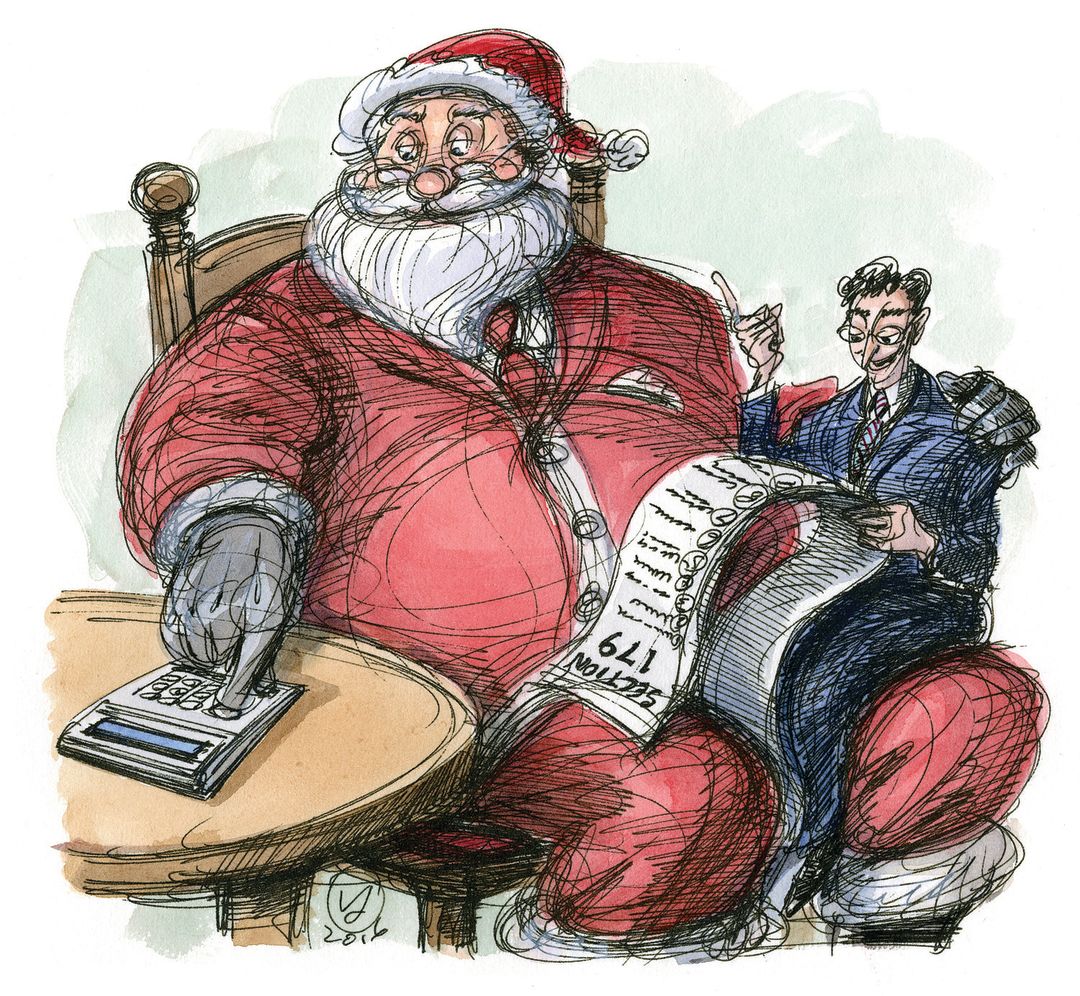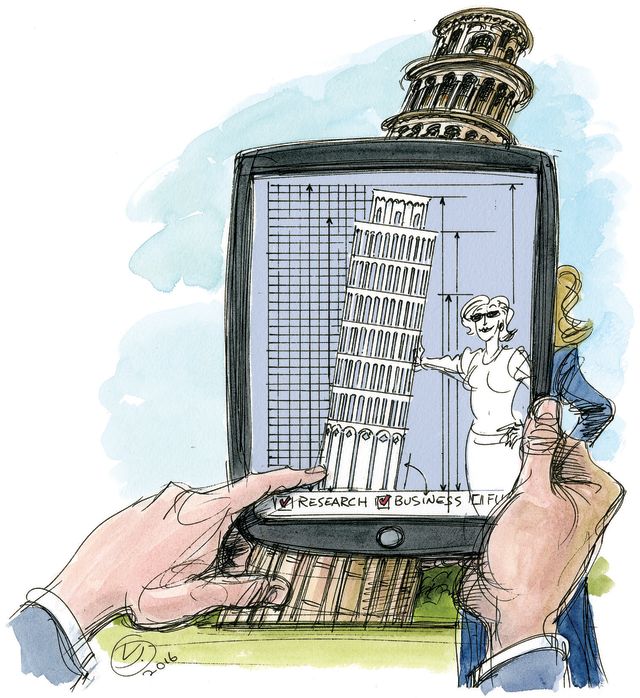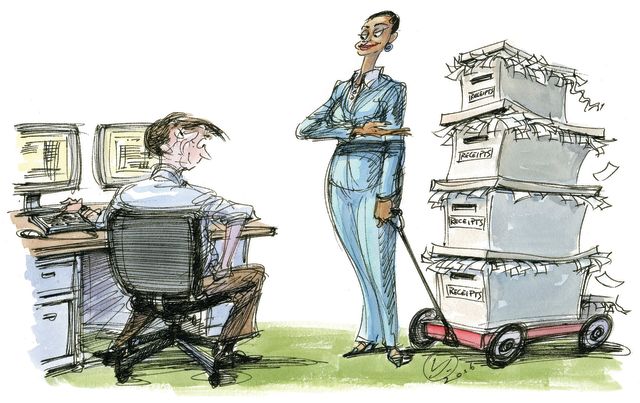Local Experts' Top Tax Tips

1. Go Shopping and Depreciate
Want to save money? Spend money, says Aubrey Lynch, a principal with CS&L CPAS. Only she didn’t phrase it quite that way. She did suggest looking into Section 179. Usually when you buy bigger-ticket items, you have to expense the cost over several years—a dribble of a deduction. As long as you have enough income (there’s always a hitch, isn’t there?), Section 179 allows you to lop off up to $500,000 in fixed asset purchases (new and used) in 2016—a veritable waterfall of accelerated depreciation. So if you’re planning to buy a used truck for your landscaping business or off-the-shelf software for your design studio within the next year, consider doing it before the corks pop on Dec. 31.
Almost as rewarding is a related accelerated depreciation provision, 168(k), nicknamed bonus depreciation. You can immediately expense 50 percent of the cost of additional new qualifying business property—even if it generates a loss—which will help you offset other income.
Let’s say you laid out $600,000 on your design studio, and your income allows you to deduct $350,000 under Section 179. And let’s imagine you spent the remaining $250,000 on appropriate new goodies. Bonus depreciation may allow you to deduct an additional $125,000. The final $125,000 you can depreciate over time.
Section 179 is the Santa Claus of the tax code. Just remember that those bureaucrats in Washington love to keep taxpayers guessing. The PATH (Protecting Americans from Tax Hikes) Act of 2015 enshrined the expansion of Section 179 as a “permanent extension,” but bonus depreciation, which nearly got the axe, will begin phasing out after this year, down to 30 percent by 2019. So gather ye rosebuds while ye may. And check with your accountant before you head to the car dealership, reminds Brian McGinn, CPA, of Complete Small Business Solutions in Sarasota. Responding to the Hummer craze of the 1990s, the tax code places special limitations on business SUV deductions.

2: Travel for Business
Flight cancellations, PowerPoint presentations and the cheese Danish diskettes in hotel continental breakfasts have given business travel a bad rap. But consider an edifying business trip outside the United States in November or December, suggests McGinn.
“I’ve had architects who have traveled to Italy to view the historic architecture. It’s entirely and directly related to their industry and refreshes their ideas,” he says. The IRS bloodhounds are sniffing for potential abuse, of course, but as long as the purpose of your travel is work, not vacation, a few days of learning in a foreign culture can “give you some tax benefit and allow you to provide better service and clear your head about your business and your direction,” McGinn says.
“Make your business fun, so that you enjoy what you’re doing,” he advises. If it involves travel, so much the better. “Whatever is ordinary, necessary and not extravagant could be a business deduction,” he says.

3. Look for Tax Credits and Get Credit
Too many small businesses miss out on tax credits, says Lynch, which are strewn across the tax code like Pokémon—so GO find them. “A credit is so much better than a deduction,” Lynch says, “and many people qualify but just overlook this.”
Unlike a deduction, which can lower taxable income and lighten your bill by a percentage, a credit reduces your taxes dollar for dollar. Farmers, for instance, may be eligible for a fuel credit. Employers who hire ex-cons, unemployed veterans and people with disabilities fresh out of vocational rehab can claim a Work Opportunity Tax Credit. Under the Federal Insurance Contributions Act (FICA), restaurant owners must pay the employer share of taxes on tips, even though those tips go straight into the pockets of their employees. So restaurateurs may file for a FICA tax credit through Form 8846. It’s complex, so don’t try this at home by yourself. However, “I have yet to find a restaurant that doesn’t qualify for that credit,” Lynch says.
With credits, you can do right by your employees and shear your tax bill. Really small businesses (fewer than 25 modest-wage employees) that comply with the Affordable Care Act can earn a tax credit up to 50 percent of the employer contribution toward premiums for two consecutive years, says Lynch.
Taking care of your staff can lead to deductions and a different kind of “credit.” Wow workers with your good intentions, even before you pony up, by establishing a retirement plan for employees, including for yourself if you’re self-employed, says McGinn. Set up certain 401K plans with a profit-sharing element by year’s end to qualify for a tax deduction or deferral, and then you can wait to fund the plans until you file your return in 2017. “There’s a litany of tax advantages,” says McGinn.

4: Collect Your Receipts
Linda Lindsay, of LLJ Accounting in Sarasota, has a large proportion of entertainers and circus workers among her clientele. Like most accountants, she gives all her customers a New Year’s planner. She also shoots them an Excel spreadsheet with orders to write down year-beginning (and 12 months later, year-end) mileage as well as every donation and expense—travel, lodging, gas, props, costumes, makeup, hair styling. “Most entertainers just don’t have the time to do this on the road, so I tell them to put every receipt in a shoebox under their seat,” she says. Once home, they can enter the figures on the computer.
“It’s not fun if they don’t use the sheet,” she confesses. “It’s like digging in the dirt.”
In a variation on the shoebox, McGinn urges clients to keep folders on their daily flight path—at the house, at the office, in the car. A credit card statement is not sufficient documentation. “Say I charge $150 at a Walmart Supercenter, and I don’t keep the receipt,” he says. “How does the IRS know that I’m not buying a TV or groceries or a tent for my Scout troop?”
Better yet, go digital, McGinn suggests. Snap a photo of the receipt, which you may be able to sync with your bookkeeping software. (Save your emails while you’re at it, he advises.)
Apps like Genius Scan, for example, allow you to take a photo of your receipt, which is automatically turned into a PDF. You can send or save this PDF to another app like Box, iCloud, Google Drive, OneDrive or any other email app, so you never have to worry about tracking down receipts.
Better record keeping is the No. 1 New Year’s resolution accountants would like to make for you. Small business owners often tell Lynch they’re too busy concentrating on operations to track income and outlay. “But [record keeping] saves you so much heartache,” she says.

5. Meet with Your Accountant
The end of the year is a great time to meet with your accountant and avert problems. You can meet your Affordable Care Act obligations, avoiding large penalties, says Lynch. You can get an accurate handle on yearly income and make sure you’ve paid in enough estimated tax. You can review your insurance and buy more coverage if you need it, adds Lindsay.
And you can go crawling to the IRS, if need be. “If you’ve received a letter from the IRS, address it,” urges Pearl Perla, CPA, who teaches bookkeeping and tax classes for the Florida Small Business Development Center (SBDC) based at the University of South Florida’s MUMA College of Business in Tampa.
Many of her clients have discovered “kinder, gentler” IRS agents, at least on a second or third call to the agency. If you’re not satisfied, she recommends the IRS Taxpayer Advocate Service, “like an ombudsman,” that guarantees movement forward on your issue within 30 days.
As McGinn points out, many accountants are small business people, too. And they have a stake in your success.
But accountants need to get to know you. When CPA Lea Graf of Sterling Tax & Accounting in Sarasota learned that a photography client had to order food to work through lunch on a shoot, she was able to deduct 100 percent for business meals.
If you keep manufacturing or construction in the U.S. rather than overseas, for instance, you may qualify for the Domestic Production Activities Deduction—“one of the instances where taxpayers can take a deduction without actually spending any money,” says Graf.
“You should have an adviser that you like,” she continues. “Then your meetings can be about planning for the future.”
“The only fun part of taxes is when you don’t owe any, and the only way you don’t owe any is you haven’t made any money,” reasons Perla. “So as long as you’ve done your due diligence and paid up, you have to rejoice and celebrate that you’re doing well in business.”
No, No, No
Local accountants (and their clients) give us the Not-To-Do list.

Beware, Pierre: As local businesses become more global, they need to track international dealings, even in Puerto Rico and other U.S. territories, warns Lynch. One IRS gotcha is failure to disclose foreign assets, pensions, bank accounts, partnerships and the like. Penalties can run a minimum of $10,000 per occurrence. Ka-ching!
Sorry, Charlie: In business, as in comedy, timing is everything. A whiff of knowledge compounds the potential for a flop. One local client heard (not from his accountant) that if he sold business assets, he could avoid a tax on the profit through a “like-kind” exchange. Indeed, Section 1031 allows you to defer paying tax on such a gain, but only if you reinvest promptly. The client sold some real estate at a price that made him smile, but because he didn’t identify the replacement property within the required 45 days, he couldn’t defer the tax. The IRS had the last laugh.
Seeing Double: One of Lindsay’s clients efiled for an extension on Tax Day, and the form bounced back. Turns out an identity thief had already submitted a false return under the client’s name and collected the refund. With this type of fraud on the rise, even procrastinators can outwit thieves by filing early for extensions.
High Jinks Ahead: In part to stem identity theft, the IRS has moved up deadlines for 11 different forms, such as 1099s and W-2s. Tax specialists are dreading the crunch. “Your accountant would appreciate an extra bottle of Maalox on Jan. 31,” says McGinn. “Or I’d love it if somebody would send over a chair massage or maybe one of those St. Bernards with a barrel on his collar.”



